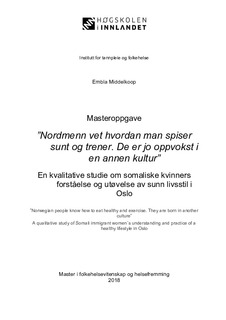| dc.contributor.author | Middelkoop, Embla | |
| dc.date.accessioned | 2019-02-07T09:06:40Z | |
| dc.date.available | 2019-02-07T09:06:40Z | |
| dc.date.issued | 2018 | |
| dc.identifier.uri | http://hdl.handle.net/11250/2584261 | |
| dc.description | Master i folkehelsevitenskap med vekt på endringer av livsstilsvaner, 2018 | nb_NO |
| dc.description.abstract | Norsk sammendrag
Hensikt og problemstilling
Formålet med denne studien var å få et innblikk i hverdagen til somaliske kvinner bosatt i Oslo og undersøke nærmere hvilke barrierer de opplevde til å utøve sunn livsstil. Hovedproblemstillingen ble dermed: ” hvordan forstår og utøver somaliske kvinner sunn livsstil?”
Teori
Pierre Bourdieu´s teorier om habitus og sosial kapital er det teoretiske rammeverket i oppgaven. I følge Bourdieu kan habitus forklare den kroppslige forankringen av kultur som en prosess der det sosiale blir innleiret i kroppen og hvordan dette vil ha en betydning for endringsprosesser i praksis (Wilken & Andreassen, 2008). I følge Bourdieu omhandler sosial kapital det sosiale nettverket vi omgir oss med, og hvilke ressurser dette nettverket gir oss (Rønningen & Starrin, 2009).
Metode
Datainnsamlingen bestod av ni individuelle semi-strukturerte intervjuer. Semi-strukturert intervju ble valgt for å ha et rammeverk rundt intervjuet, men at kvinnenes beskrivelser kom fritt frem. Intervjuene ble transkribert, deretter kodet og analysert gjennom tematisk analyse.
Resultat
Resultatet fra datainnsamlingen viser at det å ha en sunn livsstil for de somaliske kvinnene ikke handlet om å være i fysisk aktivitet eller ha et sunt kosthold, derimot ble familierelasjoner betraktet som den viktigste kilden til sunnhet. At barna deres hadde det bra og var i godt humør var også viktige kilder til sunnhet. En hektisk hverdag med stort ansvar for familien førte til at kvinnene hadde lite tid til seg selv og det å være i fysisk aktivitet og ha et sunt kosthold ble nedprioritert, som igjen satte begrensinger til å utøve en sunn livsstil.
Nøkkelord: kosthold, fysisk aktivitet, folkehelse, sunn livsstil, sosial ulikhet, minoritetskvinner | nb_NO |
| dc.description.abstract | Engelsk sammendrag/abstract
Purpose and research question
The purpose of this study was to get an insight into the everyday life of Somali women living in Oslo, and to examine the barriers that the women experienced in practicing a healthy lifestyle after migration. The research question was: ”how do Somali immigrant women understand and practice healthy lifestyle?”
Theory
Pierre Bourdieus theories about habitus and social capital are the theoretical frameworks for this paper. According to Bourdieu, the embodied culture is a process where the social is being embedded in the body and how this will affect change processes in practice (Wilken & Andreassen, 2008). Bourdieu describes social capital as the social network that we surround us with, and what resources we can gain from this network (Rønningen & Starrin, 2009).
Methods
The data collection consisted of nine individual, semi-structured interviews. Semi-structured interviews were chosen to have a framework for the interview and still allowing the women´s description be the central theme. All interviews were transcribed, then analyzed through thematic analysis.
Results
The results of the data collection show that healthy lifestyle for the Somali women was not about traditional physical activity or having a healthy diet. They considered family relations as the most important source of health. The fact that their children were happy and felt well were also important sources of health. A hectic day with a big responsibility for the family led to little time to spare for the women and that again led to them to not prioritize physical activity and healthy diet. This set limits to exercising a sufficiently healthy lifestyle.
Keywords: diet, physical activity, puclic health, healthy lifestyle, sosial inequality, immigrant women | nb_NO |
| dc.language.iso | nob | nb_NO |
| dc.subject | kosthold | nb_NO |
| dc.subject | fysisk aktivitet | nb_NO |
| dc.subject | folkehelse | nb_NO |
| dc.subject | livsstil | nb_NO |
| dc.subject | sosial ulikhet | nb_NO |
| dc.subject | minoriteter | nb_NO |
| dc.subject | kvinner | nb_NO |
| dc.subject.mesh | Diet | en |
| dc.subject.mesh | Motor Activity | en |
| dc.subject.mesh | Public Health | en |
| dc.subject.mesh | Life Style | en |
| dc.subject.mesh | Socioeconomic Factors | en |
| dc.subject.mesh | Minority Groups | en |
| dc.title | Nordmenn vet hvordan man spiser sunt og trener. De er jo oppvokst i en annen kultur: En kvalitative studie om somaliske kvinners forståelse og utøvelse av sunn livsstil i Oslo | nb_NO |
| dc.title.alternative | Norwegian people know how to eat healthy and exercise. They are born in another culture: A qualitative study of Somali immigrant women´s understanding and practice of a healthy lifestyle in Oslo | nb_NO |
| dc.type | Master thesis | nb_NO |
| dc.subject.nsi | VDP::Medisinske Fag: 700::Helsefag: 800::Samfunnsmedisin, sosialmedisin: 801 | nb_NO |
| dc.source.pagenumber | 100 | nb_NO |
